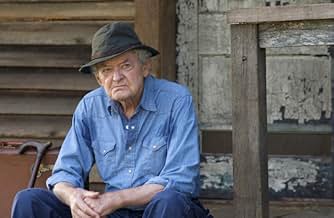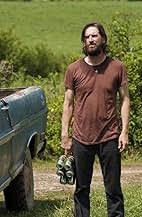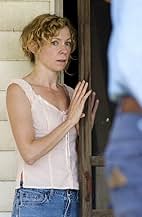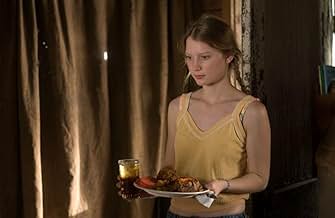IMDb RATING
7.0/10
3.1K
YOUR RATING
An aging Tennessee farmer returns to his homestead and must confront a family betrayal, the reappearance of an old enemy, and the loss of his farm.An aging Tennessee farmer returns to his homestead and must confront a family betrayal, the reappearance of an old enemy, and the loss of his farm.An aging Tennessee farmer returns to his homestead and must confront a family betrayal, the reappearance of an old enemy, and the loss of his farm.
- Awards
- 11 wins & 4 nominations total
Brian Edward Keith
- Deputy Keith
- (uncredited)
William J. Mode
- Deputy Davies
- (uncredited)
- Director
- Writers
- All cast & crew
- Production, box office & more at IMDbPro
Featured reviews
In my opinion column, On San Diego, I offered a brief positive review of That Evening Sun after viewing it at the San Diego Film Festival. Those published comments are offered below.
"That Evening Sun," starring Hal Holbrook, shown on Sunday night to a packed house as the last film of the 2009 San Diego Film Festival. Now in his 80s, Holbrook gives a tremendous and subtle performance, as do all of the other actors in this Southern Gothic set in Tennessee: Walton Goggins, Mia Wasikowska, Carrie Preston and Ray McKinnon. With a screenplay written by Scott Teems, like fine red wine, well made and maintained, every character of the movie is developed and complex -- even the barking dog!
The tension between characters, circumstances and passions makes this film a rarity, genuinely gripping from scene to scene and unpredictable to the end. The sound track is beautiful and delicately augments the emotional tension as the film wonderfully plays against the painterly rustic sharecropper house interior, forest, sunset sky and fantastically grizzled faces of authentically rendered people pursuing their respective deep, heartfelt aspirations. Like a Henry James novella, the film is underlain with ambiguity and uncertainty, empathy and shifting sympathies that will provoke conversation; one might pronounce it a good "date movie," with something for both men and women. A gem, this film is the kind one may only see at a film festival.
San Diegans were lucky to be among the first to see the final cut of this fine work. Fortunately, come Thanksgiving time, 2009, "That Evening Sun" will be seen in limited release in Los Angeles and New York theatres. Perchance it will also return to San Diego?
"That Evening Sun," starring Hal Holbrook, shown on Sunday night to a packed house as the last film of the 2009 San Diego Film Festival. Now in his 80s, Holbrook gives a tremendous and subtle performance, as do all of the other actors in this Southern Gothic set in Tennessee: Walton Goggins, Mia Wasikowska, Carrie Preston and Ray McKinnon. With a screenplay written by Scott Teems, like fine red wine, well made and maintained, every character of the movie is developed and complex -- even the barking dog!
The tension between characters, circumstances and passions makes this film a rarity, genuinely gripping from scene to scene and unpredictable to the end. The sound track is beautiful and delicately augments the emotional tension as the film wonderfully plays against the painterly rustic sharecropper house interior, forest, sunset sky and fantastically grizzled faces of authentically rendered people pursuing their respective deep, heartfelt aspirations. Like a Henry James novella, the film is underlain with ambiguity and uncertainty, empathy and shifting sympathies that will provoke conversation; one might pronounce it a good "date movie," with something for both men and women. A gem, this film is the kind one may only see at a film festival.
San Diegans were lucky to be among the first to see the final cut of this fine work. Fortunately, come Thanksgiving time, 2009, "That Evening Sun" will be seen in limited release in Los Angeles and New York theatres. Perchance it will also return to San Diego?
What a film.! Anyone who has experienced elderly members of the family being stubborn, or old fashioned without obvious reason, then this film will ring true.
Although members of our family/community age, and reach the final stages of their life does not make them an outcast, it does not make them less worthy of ourselves.
This film make the valid point that, yes, life does indeed go on, but at the same time, memories still live too, and if someone is still breathing the free air we all breath today, then they are still entitled to live out their life, and spend their living days how they see fit.
Without spoiling this film, or should I say without giving out any spoilers, basically, if you have come to that stage in your life where you have had to make the very difficult decision to put your mother, or father in a care home, watch this film.! Although your father, or mother maybe aging, and to you, look somewhat out of control, they are now, you should be listening to them more carefully, even muffled speech, of rambled they may sound, listen to them, memories live on.
This film is all about pride, being faithful to ones past, mistakes, and choices. One may make path to their own siblings which gives them the job of good fortune, but at the same time, they question you when your old, and in many peoples eyes "Past it". This film opens the eyes of the unforgiving.!
I cried watching this film, and Im 40 years young. Maybe I related to this film more than most, but at the same time, I had to write about this film, and how it impacted myself alone.
Enjoy, its a great piece of film making, and Hal, is at his best in this. We all remember him from his earlier pieces, usually in a courtroom.
Although members of our family/community age, and reach the final stages of their life does not make them an outcast, it does not make them less worthy of ourselves.
This film make the valid point that, yes, life does indeed go on, but at the same time, memories still live too, and if someone is still breathing the free air we all breath today, then they are still entitled to live out their life, and spend their living days how they see fit.
Without spoiling this film, or should I say without giving out any spoilers, basically, if you have come to that stage in your life where you have had to make the very difficult decision to put your mother, or father in a care home, watch this film.! Although your father, or mother maybe aging, and to you, look somewhat out of control, they are now, you should be listening to them more carefully, even muffled speech, of rambled they may sound, listen to them, memories live on.
This film is all about pride, being faithful to ones past, mistakes, and choices. One may make path to their own siblings which gives them the job of good fortune, but at the same time, they question you when your old, and in many peoples eyes "Past it". This film opens the eyes of the unforgiving.!
I cried watching this film, and Im 40 years young. Maybe I related to this film more than most, but at the same time, I had to write about this film, and how it impacted myself alone.
Enjoy, its a great piece of film making, and Hal, is at his best in this. We all remember him from his earlier pieces, usually in a courtroom.
Based on the short story "I Hate to See That Evening Sun Go Down" by William Gay, "That Evening Sun" presents us with an epic battle of wills between two equally immutable forces fighting over the same piece of land. The property in question is a rundown farm in rural Tennessee owned by Abner Meecham (Hal Holbrooke), an octogenarian who's just walked away from the retirement home his son (Walter Goggins) placed him in after a serious fall a few months back. When Abner gets back to his farm, he is stunned to find that - thanks to a deal brokered by his lawyer son – the place has been signed over to a white-trash, ne'er-do-well by the name of Lonzo Choat (Ray McKinnon), who now lives there with his wife (Carrie Preston) and sixteen-year-old daughter (Mia Wasikowska), with whom Abner establishes an uneasy but generally tender relationship.
Scott Teem's screenplay is multi-faceted and complex in the way it develops its characters. For instance, many of the very same qualities that make Abner so appealing to the audience – his tenacity, his commitment to principle, his uncompromising willingness to call things as he sees them – are also what make him a hard person to deal with for those who are actually a part of his life. This is especially the case with his son, who though he obviously loves his father and wants to do right by him, harbors a lifelong resentment against the old man for his harsh treatment of both himself and his now-deceased mother while he was growing up.
To a somewhat lesser extent, Lonzo is also portrayed in a three-dimensional light. Though he is an alcoholic, a wastrel, and a man prone to acts of violence against both animals and members of his own family, there is a sense that he is genuinely trying to get his life together by earning an honest living and finally being a decent provider for his loved ones.
The movie really seems to understand the tragedy of old age – of feeling as if everything you ever called your own is now being taken away from you and nobody around you seems to care. In fact, many of those people – despite, in some cases, their possible good intentions - are proactively involved in bringing that outcome about. The movie also touches upon that root and highly American value of property ownership, and the willingness to stop at virtually nothing to ensure one's hold on one's land.
"That Evening Sun" is what is called in the trade an "actors' picture," and, indeed, it is the performances that are of primary interest here. Holbrooke has always been a tremendous actor, but here he is positively transcendent as Abner, a crusty old coot who is so much more than just a crusty old coot. Goggins, the brilliant star of "The Shield" and "Justified" and a co-producer of this film, is also excellent as Paul Meecham, a role quite different from the ones in the aforementioned works. And McKinnon, Preston ("True Blood"), and Wasikowska ("Alice in Wonderland," "The Kids are All Right") are all wonderful as well.
The tone of the film is contemplative and muted, and Teems' direction is rich in atmosphere and setting.
Scott Teem's screenplay is multi-faceted and complex in the way it develops its characters. For instance, many of the very same qualities that make Abner so appealing to the audience – his tenacity, his commitment to principle, his uncompromising willingness to call things as he sees them – are also what make him a hard person to deal with for those who are actually a part of his life. This is especially the case with his son, who though he obviously loves his father and wants to do right by him, harbors a lifelong resentment against the old man for his harsh treatment of both himself and his now-deceased mother while he was growing up.
To a somewhat lesser extent, Lonzo is also portrayed in a three-dimensional light. Though he is an alcoholic, a wastrel, and a man prone to acts of violence against both animals and members of his own family, there is a sense that he is genuinely trying to get his life together by earning an honest living and finally being a decent provider for his loved ones.
The movie really seems to understand the tragedy of old age – of feeling as if everything you ever called your own is now being taken away from you and nobody around you seems to care. In fact, many of those people – despite, in some cases, their possible good intentions - are proactively involved in bringing that outcome about. The movie also touches upon that root and highly American value of property ownership, and the willingness to stop at virtually nothing to ensure one's hold on one's land.
"That Evening Sun" is what is called in the trade an "actors' picture," and, indeed, it is the performances that are of primary interest here. Holbrooke has always been a tremendous actor, but here he is positively transcendent as Abner, a crusty old coot who is so much more than just a crusty old coot. Goggins, the brilliant star of "The Shield" and "Justified" and a co-producer of this film, is also excellent as Paul Meecham, a role quite different from the ones in the aforementioned works. And McKinnon, Preston ("True Blood"), and Wasikowska ("Alice in Wonderland," "The Kids are All Right") are all wonderful as well.
The tone of the film is contemplative and muted, and Teems' direction is rich in atmosphere and setting.
An aging Tennessee farmer returns to his homestead and must confront a family betrayal, the reappearance of an old enemy, and the loss of his farm.
This is the perfect example of how to write an old bull can against the young bull one. Holebrook's character doesn't want trouble, just his pride and the right to go on living the way he once did. He doesn't have much left, but pride. The movie does a great job of making us care for Holebrook, something that was hard to pull off consistently. Hal Holebrook is magnificent, and Oscar worthy here in his portrayal of Abner Meecham. It was hard to pull off, but Holebrook manages to maintain likability along with his grouchy, potentially off-putting role. There's never a moment where we don't sympathize with him, even when he pushes the limits, we manage to emphasize with his actions. I've not seen Holebrook perform a better role than this one. Ray McKinnon is excellent as the hot-shot antagonist, wanting to take over the farm. You'll hate him, and possibly even understand his actions in some cases. Walter Goggins is very good as the ungrateful son of Holebrook's, he did well.
Bottom line. The Sundance Film Festival struck gold with this one, and you will too. A must see
9 ½ 10
This is the perfect example of how to write an old bull can against the young bull one. Holebrook's character doesn't want trouble, just his pride and the right to go on living the way he once did. He doesn't have much left, but pride. The movie does a great job of making us care for Holebrook, something that was hard to pull off consistently. Hal Holebrook is magnificent, and Oscar worthy here in his portrayal of Abner Meecham. It was hard to pull off, but Holebrook manages to maintain likability along with his grouchy, potentially off-putting role. There's never a moment where we don't sympathize with him, even when he pushes the limits, we manage to emphasize with his actions. I've not seen Holebrook perform a better role than this one. Ray McKinnon is excellent as the hot-shot antagonist, wanting to take over the farm. You'll hate him, and possibly even understand his actions in some cases. Walter Goggins is very good as the ungrateful son of Holebrook's, he did well.
Bottom line. The Sundance Film Festival struck gold with this one, and you will too. A must see
9 ½ 10
I've been looking forward to "That Evening Sun" for a while now, and not just because it was shot in the county and surrounding towns where I live here in Tennessee.
My anticipation was largely because of Hal Holbrook, an iconic performer I have seen in his one-man "Mark Twain Tonight!" stage show, and who appears in occasional guest shots on TV where things must move very fast, and less often in film, where things are allowed to proceed at a more measured pace.
I was not disappointed, the character study of Abner Meechum, the refugee from an old folks' home and renegade on his own property is rich, complex, and satisfying throughout. Admittedly it may not be a big stretch for Holbrook to play a cranky 80-year-old, but that doesn't lessen the impact of the performance at all.
Surrounding him is a cast of surprisingly strong players: the antagonist Lonzo Choat (Ray McKinnon) is an especially worthy and believable opponent, and supporting cast Pamela and Ludie Choat (Mia Wasikowska and Carrie Preston) likewise hit just the right notes, tugging this farm county family drama at precisely the right pace. I especially enjoyed Barry Corkin, perfect in the Wilfred Brimley-esquire good neighbor role, and a special mention for the cameo by Dixie Carter, Hal Holbrook's wife in the movie as well as in real life.
Where I saw the film, at a packed 1pm matinée, the audience laughed at several of the moments, self-reflective as they were of Tennessee rural life. I don't know that they would garner that kind of introspective appreciation in other parts of the country, but here, people know their country folk and can laugh with, rather than at them.
"That Evening Sun" is a simple yarn: Abner tires of life in a retirement home and returns to the farm he and his deceased wife occupied for most of their lives, only to find it occupied by a neer-do-well, but one with a property lease Abner's "guardian son" has approved. The story is more than the tug-of-war between owner and lessor, it is between hard-working- older and layabout younger, and between lives at noon and the sundown that inevitably follows. Taken from William Gay's short stories of Southern life, "I Hate To See That Evening Sun Go Down," it's the unraveling of a proud man in the twilight, as his own sun is setting, and his fight with the oncoming night.
Hal Holbrook is a treasure. So is this film. It's Indie with a capital "I", an armful of festival awards, and, one hopes, a long run ahead.
My anticipation was largely because of Hal Holbrook, an iconic performer I have seen in his one-man "Mark Twain Tonight!" stage show, and who appears in occasional guest shots on TV where things must move very fast, and less often in film, where things are allowed to proceed at a more measured pace.
I was not disappointed, the character study of Abner Meechum, the refugee from an old folks' home and renegade on his own property is rich, complex, and satisfying throughout. Admittedly it may not be a big stretch for Holbrook to play a cranky 80-year-old, but that doesn't lessen the impact of the performance at all.
Surrounding him is a cast of surprisingly strong players: the antagonist Lonzo Choat (Ray McKinnon) is an especially worthy and believable opponent, and supporting cast Pamela and Ludie Choat (Mia Wasikowska and Carrie Preston) likewise hit just the right notes, tugging this farm county family drama at precisely the right pace. I especially enjoyed Barry Corkin, perfect in the Wilfred Brimley-esquire good neighbor role, and a special mention for the cameo by Dixie Carter, Hal Holbrook's wife in the movie as well as in real life.
Where I saw the film, at a packed 1pm matinée, the audience laughed at several of the moments, self-reflective as they were of Tennessee rural life. I don't know that they would garner that kind of introspective appreciation in other parts of the country, but here, people know their country folk and can laugh with, rather than at them.
"That Evening Sun" is a simple yarn: Abner tires of life in a retirement home and returns to the farm he and his deceased wife occupied for most of their lives, only to find it occupied by a neer-do-well, but one with a property lease Abner's "guardian son" has approved. The story is more than the tug-of-war between owner and lessor, it is between hard-working- older and layabout younger, and between lives at noon and the sundown that inevitably follows. Taken from William Gay's short stories of Southern life, "I Hate To See That Evening Sun Go Down," it's the unraveling of a proud man in the twilight, as his own sun is setting, and his fight with the oncoming night.
Hal Holbrook is a treasure. So is this film. It's Indie with a capital "I", an armful of festival awards, and, one hopes, a long run ahead.
Did you know
- TriviaDixie Carter's final film appearance.
- Quotes
Abner Meecham: Ha! Folks in hell will be eating Eskimo Pies before Lonzo Choat hauls me anywhere.
- How long is That Evening Sun?Powered by Alexa
Details
- Release date
- Country of origin
- Official site
- Language
- Also known as
- I Hate to See That Evening Sun Go Down
- Filming locations
- Production companies
- See more company credits at IMDbPro
Box office
- Gross US & Canada
- $281,350
- Opening weekend US & Canada
- $7,330
- Nov 8, 2009
- Gross worldwide
- $281,350
- Runtime
- 1h 49m(109 min)
- Color
- Sound mix
- Aspect ratio
- 2.35 : 1
Contribute to this page
Suggest an edit or add missing content































